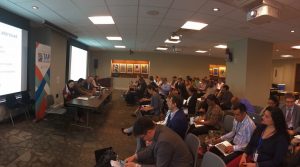
TAP Network Workshop, 14 July 2017, UN
On our second day at the High Level Political Forum #HLPF we kicked off with a formal side event at the UN Church Center organized by the TAP Network — Beyond VNRs: Global Workshop on Civil Society “Parallel Reports” for SDG16. The TAP Network engages some of the foremost expert organizations on the issues of transparency, accountability and participatory governance. It is SDG16 that includes access to information as an explicit target for Member States.
Shadow reports offer a very different perspective on progress towards SDG16. The indicators presented allowed us to learn about challenges, drawing on unofficial data across several countries including Brazil (Joara Marchezini, Article 19), Chile (Alberto Precht, Chile Transparente) and Nigeria (Chioma Kanu, Civil Society Legislative Advocacy Center).
Joara argued, for example, that Brazil may be one of the worst countries if you are trying to find data, whether it is about hospitals officially offering abortion procedure or information about water crisis. The Government refuses to admit there is a crisis, and as for health care they are trying to disable the access to these rights. Pretty challenging!
In Nigeria the situation is also blurry: even though the Government issued a document “from MDGs to SDGs” it is nowhere to be found on their official website.

How else :)?
Among the best takeaways from this session, there was the presentation of the SDG16 Data initiative, Ursula Knudsen Latta who provided a story about a useful platform for Measuring and tracking SDG16, highlighting the importance of translating data into something understandable for all (instead of just offering numbers, maps and graphs without clear meaning). They also offered a great resource on The SDG16 Data Initiative 2017 Global Report. Check it out!
There was a thoroughly engaging discussion on data indicators at the national level and how target setting is considered a major concern among countries with on-going initiatives to gather data. There is also an agreement that there should be a push to harmonize SDGs with national development plans and ensure government commitment. Relevant points were made by participants including the need for better networks and civil society involvement as third party presenters of the indicators and making the most of the synergies between and among these indicators.
Another important contribution on SDG16 was the Data Initiative and the CIVICUS Monitor project. The first one is a collective effort by a consortium of organisations seeking to support the open tracking of the global commitments made by more than 194 countries on peace, justice, and strong institutions. The CIVICUS Monitor is an exciting project working with an influential network of organisations at a different levels (local, national, regional and international), and reflects the spectrum of civil society, at the moment of the discussion we all were seeing the situation of our own countries.

IFLA Preparing to Speak at Main Session
One of the main sessions of this day was the Science-policy interface and emerging issues in which several countries mentioned the need for mechanisms to enhance the digital skills of their citizens. Several points were highlighted by national représentatives. Focusing on the need to mobilize national research systems, it was pointed out that policy had to draw on science, technology and innovations in order to implement the SDGs successfully. Politics may guide and encourage science. In launching the process, interactions at the local level have to be privileged.
Representatives of Majors Groups recalled the necessity to pay attention to particular issues. In this regard, IFLA Manager of Policy and Advocacy Stephen Wyber took the floor to underline the need for access to information and call on the United Nations to take leadership and adopt an Open Access , as UNESCO, WIPO and WHO have already done.
Thoughts?
Even though access to information was discussed on many occasions, none of the speakers mentioned partnering up with libraries in pursuit of meaningful access to information. Let’s ask tomorrow, shall we? To be continued!
Bonus takeaways:
Pingback: Échos des bibliothèques au HLPF 2017 de l’ONU (I) | OPENLIB.SN